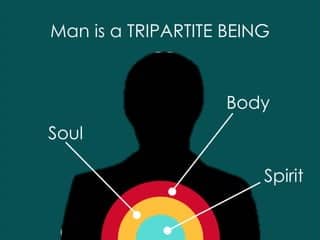Man: A Tripartite Being
- By Pastor Dele Ilesanmi, Ph.D.
- Published in Christopress Blog

Man: A Tripartite Being
By
Pastor Dele Alaba Ilesanmi, PhD
Text Reading: 1Thessalonians 5: 23:
“And the very God of peace sanctify you wholly; and I pray God your whole spirit and soul and body be preserved blameless unto the coming of our Lord Jesus Christ”.
Fig 1: The difference between Body, Soul, and Spirit
Fig 2: The Tripartite Man (Trichotomy of Man)
Man is a spirit, he has a soul but lives in a body.
Fig 3: The Tripartite Man (Trichotomy of Man)
The Tripartite Man, also known as the Trichotomy of Man, is a biblical concept describing the three distinct aspects of human nature. This Trinitarian composition of man describes man as consisting of three distinct but interconnected parts:
- Body (Physical) (Soma):
– The physical body, made up of flesh and blood (1 Corinthians 15:50)
– Subject to temptation, weakness, and decay (Romans 6:12, 8:10; 1Cor 15:42-44)
– Formed out of clay (Job 33:6)
– Will return to dust after death (Genesis 3:19; Eccl 12: 7)
- Soul (Emotional/Relational) (Psyche):
– The seat of emotions, desires, personality and intellectual aspect (Psalm 42:11, 1 Peter 2:11)
– Experiences emotions like joy, sorrow, and love (John 11:35, 1 John 4:8)
– Connects with others through relationships (Genesis 2:24, Ephesians 5:28-31)
- Spirit (Spiritual) (Pneuma):
– The breath of life, imparting spiritual life (Genesis 2:7, John 20:22)
– Communes with God, enabling faith and worship (Romans 8:16, 1 Corinthians 6:17)
– Longs for fellowship with God and eternal life (Psalm 42:2, 2 Corinthians 5:8; John 4: 24)
– The immaterial, eternal aspect of humanity
– Connects humans to God, enabling spiritual life and communion
Note that this tripartite nature is rooted in Scripture:
– 1 Thessalonians 5:23: “May your whole spirit, soul, and body be preserved blameless…”
– Hebrews 4:12: “Dividing soul and spirit, joints and marrow.”
Interactions between the Three Parts:
– Body and Soul: Physical experiences affect emotions and relationships (Proverbs 14:13, 1 Corinthians 7:5)
– Soul and Spirit: Emotions and desires influence spiritual decisions (Psalm 42:11, Romans 8:5-8)
– Body and Spirit: Physical actions can impact spiritual well-being (1 Corinthians 6:19-20, Romans 12:1)
Implications:
- Holistic understanding: Recognizes interconnectedness of body, soul, and spirit.
- Spiritual significance: Emphasizes humanity’s inherent spiritual nature.
- Biblical anthropology: Informs understanding of human identity and purpose.
- Recognizes interconnectedness of physical, emotional, and spiritual aspects
- Provides framework for understanding human struggles and weaknesses
Contrasting Views:
– Dichotomy (Body and Soul/Spirit): Some theologians argue for a two-part view.
– Monism (Only Body): Some philosophies reduce humanity to physical existence.
Practical Applications:
- Integrated living: Care for body, soul, and spirit.
- Spiritual growth: Nurture your spirit through prayer, worship, and Scripture.
- Wholeness: Recognize the interconnectedness of your being.
Theological Perspectives:
- Creation: God formed humans as tripartite beings.
- Fall: Sin affected all aspects of humanity.
- Redemption: Christ’s work restores and redeems body, soul, and spirit.
Theological Perspectives:
- Christian: Trinitarian composition reflects God’s triune nature (Father, Son, Holy Spirit)
- Jewish: Similar concepts found in Hebrew Scriptures (e.g., nephesh, ruach, basar)
Additional resource for Sunday school teachers on 20/09/2024
Reference
Ilesanmi, Dele A. “Trichotomy vs Dichotomy: The Biblical and Theological Survey of Man’s Composition” in Christopress, 2020. See https://www.christopress.com/trichotomy-vs-dichotomy-the-biblical-and-theological-survey-of-mans-composition-2/. Retrieved 20/09/2024.
Share this:

